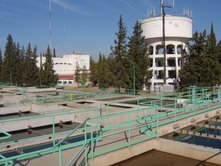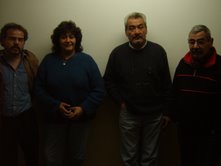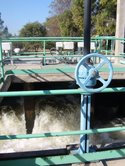Water has been in this city’s headlines for months and the Popular Commission for the Recuperation of Water (CPRA) is spearheading the community movement to oust multinational corporate management of water resources, mainly through direct action and education of the populace.
Aguas Cordobesas manages the municipal water system, but is governed by a conglomerate of international companies, with France’s Suez playing the part of villain for community activists. The Suquía water treatment facility operated by Aguas Cordobesas sits in a ritzy neighborhood near Córdoba, Argentina’s second biggest city eight hours northwest of the capital, Buenos Aires. Built in the mid-1970’s, the Suquía plant converts water from its namesake river into potable water for one million Córdoba residents, more than half of the city’s population.
Our host for the tour, Marcela Dávila, is in corporate communications. A young professional, she has worked for Aguas Cordobesas for five years, a steady job in a not so stable economy. She takes us step by step through the process that most people, particularly in the United States, take for granted.
Upon reaching the plant, a filter removes large river debris and water goes through a series of physical and chemical filtration processes to make it potable for consumers. Three chemical additives are used: first, aluminum-sulfite to ease the removal of particulate matter, then chlorine to kill any potentially harmful bacteria, and finally lime to stabilize the pH. This, plus two physical filtering processes serve to make the water drinkable. The final product must conform to standards set by national and provincial code, and to specifications in Aguas Cordobesas’ contract with the municipal government.
 Agua Cordobeses also has one other technology up its sleeve. Ozone purification works to kill bacteria and to reduce turbidity i.e. to make the water more clear. Ozone is widely accepted for use in water purification plants internationally, and is seen as a healthy alternative to potentially carcinogenic chlorine treatment.
Agua Cordobeses also has one other technology up its sleeve. Ozone purification works to kill bacteria and to reduce turbidity i.e. to make the water more clear. Ozone is widely accepted for use in water purification plants internationally, and is seen as a healthy alternative to potentially carcinogenic chlorine treatment.
While Marcela boasts that the Suquía plant is the only place in South America with the infrastructure use ozone purification, they only use this technology during the summer months when the incoming water has a high algae content. The day of our visit, the ozone purification process was not in use. In fact, one of the complaints of citizen groups primarily focused on rejecting private management is that cheaper chlorine technology is used when the more pricey ozone technology is available.
Public vs. Private
Aguas Cordobesas’ corporate office sits on a suburban highway with a smartly decorated lobby and an indoor waterfall cascading down a marble backdrop. Previously operated by the municipal government, Córdoba’s water utility was wrapped up in the Argentine wave of privatization under former President Carlos Menem (1989-1999). In 1997, a conglomeration of private companies led by French water giant Suez won the contract. After some consolidation, Suez now owns 39% of Aguas Cordobesas, the remaining portion held by one Spanish and three Argentine financing firms.
"In the early nineties, the waters system in Córdoba collapsed from a combination of corruption, bureaucracy, and inefficiency," according to Marcela. "Before the transition to private management, roughly 77% of the city had potable water; now that number is up to 98%." This statistic is controversial and community activists allege it has taken place while further marginalizing the population that also struggles to pay its bills or be connected to municipal services at all.
 The contract between the Municipal Government and Aguas Cordobesas stipulates that the company pay the government a commission for use of raw material, i.e. water from the river. However, after the 2001 Argentine economic collapse that cut the value of the Argentine peso to one-third of its international value, the company stopped making those payments. Marcela explains that the contract stipulated payments in U.S. dollars, but after the collapse Aguas Cordobesas was unable to make the payments as their income is generated from people paying their bills in pesos. In the December 2005 renegotiated contract, Aguas Cordobesas’ unpaid commissions were forgiven, and future commission payments will be in pesos.
The contract between the Municipal Government and Aguas Cordobesas stipulates that the company pay the government a commission for use of raw material, i.e. water from the river. However, after the 2001 Argentine economic collapse that cut the value of the Argentine peso to one-third of its international value, the company stopped making those payments. Marcela explains that the contract stipulated payments in U.S. dollars, but after the collapse Aguas Cordobesas was unable to make the payments as their income is generated from people paying their bills in pesos. In the December 2005 renegotiated contract, Aguas Cordobesas’ unpaid commissions were forgiven, and future commission payments will be in pesos.
After the collapse, Aguas Cordobesas increased prices for the consumer by 50%. According to Marcela, this was done on a sliding scale based on income. This does not jive with the stories told of water bill increases up to 500% from members of the Popular Commission for the Recuperation of Water.
"The general public is happy overall with Aguas Cordobesas’ services: we received a 90% approval rating from our customers," reports Marcela. The Commission, on the other hand, estimates that 70% of consumers are dissatisfied with some aspect of the service, and advocates for the small percentage of people who do not have water service to get it.
When asked about Aguas Cordobesas’ relationship with the government, Marcela laughs nervously. "On the side of technology, we are all together; on the side of politics and economics we are divided."
The People’s Movement
The cramped office has all the telltale signs of a workspace dedicated to an under-funded movement. Fluorescent lighting illuminates stacks of press releases, and posters of various campaign slogans cover the walls. Smoke hangs in the air and drinking gourds full of máte, a bitter South American tea, are passed around.
 Luis Bázan and Gustavo Spedale are former members of the Sanitary Workers Syndicate of Córdoba and the most vocal spokespeople for returning the control of water to the municipality. Both gracefully graying at the temples, they are lifelong residents of this province and annunciate a string of problems and potential solutions. "We are made of water," Gustavo offers, "and access to it is a right."
Luis Bázan and Gustavo Spedale are former members of the Sanitary Workers Syndicate of Córdoba and the most vocal spokespeople for returning the control of water to the municipality. Both gracefully graying at the temples, they are lifelong residents of this province and annunciate a string of problems and potential solutions. "We are made of water," Gustavo offers, "and access to it is a right."
Neither are advocating for straight up nationalization, as has taken place in early 2006 in both the Argentina capital of Buenos Aires and provincial capital of Santa Fe. After several years of Suez running the municipal water systems in those two cities, the people rebelled. When Suez’s contracts came up for renewal, unhappy consumers combined with the government of Argentina President Nestor Kirchner decided to risk government management of water resources rather than continued foreign control. Kirchner, who has been attempting to right some of the grievous privatization wrongs instituted under President Menem, led Suez to a cordial escape route. When Kirchner couldn’t guarantee that citizens would continue to pay their water bills after price hikes, the contracts with Suez were voided. Many people thought this change would extend to Córdoba, but today the city remains the last frontier for Suez in all of Argentina.
In the humble office of Popular Commission for the Recuperation of Water, Bázan and Spendale articulate a clear alternative to the current management of the resource many people around the globe define as a fundamental human right. "A joint commission of the national and Cordoban provincial governments should manage the water system side by side with the workers who run the treatment plants and maintain the pipes," they say. Non-governmental organizations and institutions such as the prestigious University of Córdoba should form a monitoring board that would work to insure high quality water in sufficient quantity, and deter corruption – the real ruin of the nationally run water system in the years leading up to Suez’s takeover.
Córdoba is the last place in the country to maintain its water services in Suez’s hands. "Only the government has the authority to guarantee access to clean water," Bázan insists. But it is not clear that the government has an interest in taking back control of the water resources.
The provincial government, led by conservative governor José De la Sota, signed a new contract with Suez in December 2005, which would keep water management in private hands until 2027.
Irreconcilable Differences?
Marcela Dávila is proud to be a Cordobesa, and also loves her job under Suez management. "Aguas Cordobesas is a good place to work," she affirms after the tour’s end as we hurried back to the corporate offices for her company volleyball game. She thinks the ruckus in the city will calm down and the foreign owners will figure out the kinks in the relationship with the Argentine government.
The members of the Popular Commission, on the other hand, think it is only a matter of time until Córdoba goes the way of Bolivia and kicks out exploitative multinational corporations. And what does the provincial government want? They are an island of conservatism in the midst of Kirchner’s liberal housecleaning, according to Bázan. It appears that the government does want to deal with the headache of managing the water system and at the same time struggles to respond to constituent demands.
 We ask if there is any space for dialogue between these different visions of the cosmos – a joint task force, perhaps, that could work on a management plan incorporating the interests of the various parties. "The positions are irreconcilable," Bázan negates with a shake of his head. "The utilities need to be managed through real, participatory democracy and the bourgeois government is in crisis. They don’t know how to govern that way."
We ask if there is any space for dialogue between these different visions of the cosmos – a joint task force, perhaps, that could work on a management plan incorporating the interests of the various parties. "The positions are irreconcilable," Bázan negates with a shake of his head. "The utilities need to be managed through real, participatory democracy and the bourgeois government is in crisis. They don’t know how to govern that way."
Everyone is firm in their corners, fighting for their own victory, and nobody has found a way to drop the defense and sit down at the negotiating table. To co-exist democratically, the communication will have to begin between these polarized interests.
In a tiny shop near Córdoba’s central plaza, a local resident passes on a bit of wisdom about the water fiasco. "We have a local saying here: If you want to be sweet, don’t talk politics."
Josh Dankoff and Mneesha Gellman live in Buenos Aires where they regularly discuss water and drink politics.
